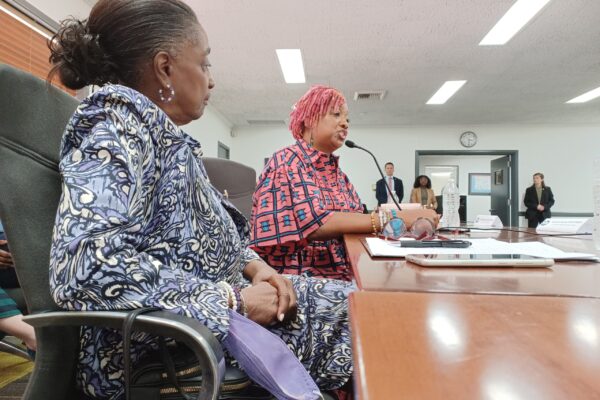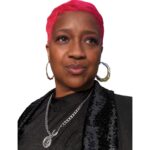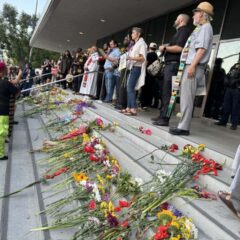Vice President Kamala Harris recently hosted a roundtable with faith leaders on the state of reproductive health care in the United States. The event, held at the Los Angeles County Federation of Labor headquarters, comes as a leaked draft opinion suggests that the Supreme Court is poised to overturn Roe v. Wade, which will likely cause abortion to banned or greatly restricted in about half the US states.
CRCC’s Rev. Dr. Najuma Smith-Pollard, assistant director of community and public engagement, delivered the following summative comments at the end of the roundtable.
Greetings, Madame VP! Thank you for inviting all of us into this space to share with you, as trusted voices from around Southern California. I want to begin with why I’m here. It is not out of disregard for my faith that I support Roe v. Wade. I hope we are able to stay Roe’s being overturned because of my faith.
And I believe all of us are here today because we are fueled by our faith.
In my faith tradition—Christianity—the leading tenets are about trust, belief, love, grace, mercy, hope and justice. Justice is a leading tenet in the Christian faith tradition.
I am disturbed by what I see happening among some who claim to be of a Christian tradition. Their efforts to take away the right of a woman to choose and have autonomy over her body is injustice!
It is important to me to center why this is so.
First, when a woman is at the place of needing or wanting to have an abortion, she is already managing a level of personal risk, inequity and potential harm. If the courts are successful in overturning Roe, we set up women all across this nation to experience much greater risk, inequity and especially harm that touches all areas of her life: mentally, emotionally, physically and financially.
Second, I agree with others in the room that we have to reclaim and broaden the meaning of “pro-life.” Being pro-life does not stop at bringing a pregnancy to term, but also includes the life of the mother, and potentially others in the home, as women are all too often carrying the responsibilities of other people as well. If Roe is overturned, we could see devastating impacts on the mental health of women forced to bring to term unwanted or life-threatening pregnancies.
I want to ensure that we center the issue of mental health in this discussion. Even in those instances when they have fairly healthy pregnancies and support, many women often experience postpartum depression, melancholy, sadness and other mental health challenges. Imagine what being forced to bring a pregnancy to term would do to the mental health of so many women!
Third, I call this development at the Supreme Court an act of injustice because at the heart of these efforts to overturn Roe are racism and white supremacy. Because my time is limited, that is all that I will say about that. You all know what that means.
Finally, a lot has been said about self-determination. Well, one thing is for sure: No one can legislate a woman’s self-determination. When and if a woman has decided an abortion is what she needs, she will determine for herself the next course of action—which may likely include an unsafe abortion if Roe is overturned.
Unsafe abortions rank in the top four causes of maternal mortality and maternal morbidity. Women will determine for themselves what they need, and no legislation can stop that. The overturning of Roe will lead to an increase in unsafe abortions. This is injustice!
Now, you asked about what we have done and what we are doing in our communities since the leaked Supreme Court documents came out. At the church I pastor, we partnered with Abolitionist Sanctuary and hosted an Abolitionist Sunday service, led by Dr. Nikia S. Robert, who preached a message that centered the issue of Roe and women losing autonomy over their bodies.
Her text from Scripture was when Mary is given word that she is pregnant, and how even in that moment Mary chose to bring forth the baby.
Our goal for the Abolitionist Sunday was to help the congregation see the issue through a theological lens. I will continue to preach sermons that help our community see these issues and others through a theological lens.
I’ll close with this story: As a pastor, I talk with people about a lot of their personal life issues. One day, a young lady came to my office and said she was “in trouble.” And she said to me, after some discussion about her experience with the court system, “Pastor, I don’t need to be judged, persecuted and I damn sure don’t need to be prosecuted. I need help!”
The people we serve look to us for help, not judgment and condemnation about their condition or situation. I believe everyone at this table is here to help. We will help! We are the help that is needed. Our faith compels us to help. That’s why we are here. We will direct our efforts to help the millions of women who will be negatively impacted if Roe is overturned.
Read more about the roundtable from Religion News Service.
Rev. Najuma Smith is Assistant Director of Community and Public Engagement with the USC Center for Religion and Civic Culture.





